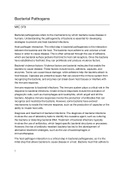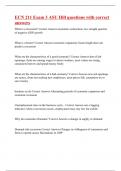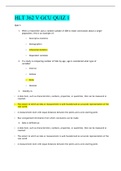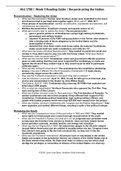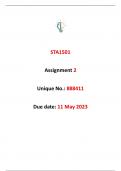Lecture Notes Ethics
Lecture 1:
Virtue = behavior showing high moral standards.
Business Science and Business Ethics
• Business Science focuses on organizations
o organizations as agents;
§ organizations make decisions in the market or global economy. These
decisions have consequences to other organizations, to other
institutions and to people.
o organizations as environments
§ people participate, they work, they affect each other through their
interactions.
• Both perspectives elicit fundamental ethical questions e.g.,
o if organizations are agents, their behavior can be evaluated on ethical grounds:
which of their actions and decisions are ethically justifiable?
o if organizations are environments (i.e., structured groups of agents), then how
does the organizational structure affect the behavior of the individual agents
within the organization and outside the organization from an ethical
perspective?
• Business Science focuses on markets:
o markets as environments in which organizations operate.
§ it is the space in which organization interact, or the medium that allows
organizations to interact.
o markets as coordination systems alternative to organizations.
§ markets offer an alternative way for people to organize themselves and
coordinate with each other.
• Again, both perspectives elicit fundamental ethical questions e.g.,
o if markets are environments in which organizations operate, how do
organizations balance their need to be competitive with their ethical standing?
And how should markets be regulated in a way that makes it possible for
organizations to find a balance?
o if markets are alternative to organizations, then in which ways this difference
affects the forms of evaluations (including ethical evaluations) practiced within
and outside organizations?
• Business Science focuses on markets in society:
o the impact of markets on society.
o the impact of society on markets.
• Both perspectives elicit fundamental ethical questions e.g.,
o to which extent current societal values are affected (or should be affected) by
“what is good for the markets?”
o to which extent should regulations on markets reflect societal values?
Ethical Decision-making
• The process of evaluating and choosing among alternatives in a way that is consistent
with ethical principles. This entails:
, o recognizing alternatives;
o recognizing stakeholders
§ who will be affected by our actions
o recognizing consequences.
§ how will they be affected
• Decision-making processes are typically multi-dimensional;
• Hence, decisions involve clashes of legitimate rights or values or different principles
and notions of what is good:
• Core to ethical decision-making is the ability to balance clashing values;
• No clash of values – than there is no ethical problem
What Ethical Behavior is not:
• Not the same as acting according to one’s feelings/emotions
• Not the same as acting according to religious beliefs
• Not the same as abiding by the law
• Not the same as following social conventions/ culturally accepted norms
• Not the same as acting on the basis of scientific knowledge
-> Thus, although feelings, beliefs, legal and social norms, and true facts and evidence might
provide valuable input to consider, they often are not enough, and ethics cannot be reduced to
any of these aspects.
What is hard about ethical decision-making:
• Is there an unquestionable basis on which we can ground our ethical principles?
• Different answers:
o Aristotle: do what brings you closer to virtue
o Kant: do what respects human fundamental dignity and self-determination
o Utilitarianism: do what provides the most good and the least harm – look at the
consequences / outcome as the basis.
o Rawls: do what is necessary to “share one another’s fate” – about fairness
o Communitarianism: obligations to our communities – we as humans are part of
communities, this comes with obligations.
• These general ethical principles might clash with each other when we try to apply
them to concrete situations.
Lecture 2:
Beginning of this journey:
• The word ethics is derived from the Greek word (êthos) meaning character, custom or
habit.
• Today ethics can mean:
, o a set of moral principles: a theory or system of moral values
o the discipline dealing with what is good and bad and with moral duty and
obligation.
Aristotle
• Greek philosopher
o student of Plato’s Academy in Athens
o Tutor of Alexander the Great
o Founder of the Lyceum in Athens
o The Corpus Aristotelicum is what we are left
§ logic, physics, metaphysics, ethics & politics, rhetorics & poetics.
o Sentences:
§ “Quality is not an act, it is a habit”
§ “All virtue is summed up in dealing justly”
§ He who is unable to live in society, or who has no need because he is
sufficient for himself, must be either a beast or a god”
§ “I have gained this from philosophy: that I do without being
commanded what others do only from fear of the law”
Ethics for Aristotle:
• Ethics is not a theoretical discipline:
• We are asking not because we want to satisfy our curiosity, but because by knowing
we will be more capable to reach it.
• Give answer to the practical question: How should men best live?
• Give answer to questions such as: What is the highest good?
• And these questions are always connected with politics.
The highest good:
• Eudaimonia (eu = good, daimōn = spirit)
o often translated as happiness, flourishing, well-being, welfare
• Aristotle: “Verbally there is a very general agreement; for both ordinary men and wise
men say that it is [eudaimonia], and identify living well and faring well with being
happy; but about what [eudaimonia] is they disagree, and the many do not give the
same account as the wise”
• What could eudaimonia consist of:
o pleasure? wealth? honor? having virtue?
• Aristotle continuous: “for the former think it is some plain and obvious thing like
pleasure, wealth or honor.”
The highest good and the Telos:
• According to Aristotle, the highest good:
o is self-sufficient, is desirable for itself
o is not desirable for the sake of some other good, and
o all other goods are desirable for its sake.
• Hence, the highest good is the ultimate purpose, or end.
• Telos: goal, end, purpose, function
• Teleological: relative to the purpose
• Goodness resides in the fulfilment of one’s telos.
Logos as human Telos:
Lecture 1:
Virtue = behavior showing high moral standards.
Business Science and Business Ethics
• Business Science focuses on organizations
o organizations as agents;
§ organizations make decisions in the market or global economy. These
decisions have consequences to other organizations, to other
institutions and to people.
o organizations as environments
§ people participate, they work, they affect each other through their
interactions.
• Both perspectives elicit fundamental ethical questions e.g.,
o if organizations are agents, their behavior can be evaluated on ethical grounds:
which of their actions and decisions are ethically justifiable?
o if organizations are environments (i.e., structured groups of agents), then how
does the organizational structure affect the behavior of the individual agents
within the organization and outside the organization from an ethical
perspective?
• Business Science focuses on markets:
o markets as environments in which organizations operate.
§ it is the space in which organization interact, or the medium that allows
organizations to interact.
o markets as coordination systems alternative to organizations.
§ markets offer an alternative way for people to organize themselves and
coordinate with each other.
• Again, both perspectives elicit fundamental ethical questions e.g.,
o if markets are environments in which organizations operate, how do
organizations balance their need to be competitive with their ethical standing?
And how should markets be regulated in a way that makes it possible for
organizations to find a balance?
o if markets are alternative to organizations, then in which ways this difference
affects the forms of evaluations (including ethical evaluations) practiced within
and outside organizations?
• Business Science focuses on markets in society:
o the impact of markets on society.
o the impact of society on markets.
• Both perspectives elicit fundamental ethical questions e.g.,
o to which extent current societal values are affected (or should be affected) by
“what is good for the markets?”
o to which extent should regulations on markets reflect societal values?
Ethical Decision-making
• The process of evaluating and choosing among alternatives in a way that is consistent
with ethical principles. This entails:
, o recognizing alternatives;
o recognizing stakeholders
§ who will be affected by our actions
o recognizing consequences.
§ how will they be affected
• Decision-making processes are typically multi-dimensional;
• Hence, decisions involve clashes of legitimate rights or values or different principles
and notions of what is good:
• Core to ethical decision-making is the ability to balance clashing values;
• No clash of values – than there is no ethical problem
What Ethical Behavior is not:
• Not the same as acting according to one’s feelings/emotions
• Not the same as acting according to religious beliefs
• Not the same as abiding by the law
• Not the same as following social conventions/ culturally accepted norms
• Not the same as acting on the basis of scientific knowledge
-> Thus, although feelings, beliefs, legal and social norms, and true facts and evidence might
provide valuable input to consider, they often are not enough, and ethics cannot be reduced to
any of these aspects.
What is hard about ethical decision-making:
• Is there an unquestionable basis on which we can ground our ethical principles?
• Different answers:
o Aristotle: do what brings you closer to virtue
o Kant: do what respects human fundamental dignity and self-determination
o Utilitarianism: do what provides the most good and the least harm – look at the
consequences / outcome as the basis.
o Rawls: do what is necessary to “share one another’s fate” – about fairness
o Communitarianism: obligations to our communities – we as humans are part of
communities, this comes with obligations.
• These general ethical principles might clash with each other when we try to apply
them to concrete situations.
Lecture 2:
Beginning of this journey:
• The word ethics is derived from the Greek word (êthos) meaning character, custom or
habit.
• Today ethics can mean:
, o a set of moral principles: a theory or system of moral values
o the discipline dealing with what is good and bad and with moral duty and
obligation.
Aristotle
• Greek philosopher
o student of Plato’s Academy in Athens
o Tutor of Alexander the Great
o Founder of the Lyceum in Athens
o The Corpus Aristotelicum is what we are left
§ logic, physics, metaphysics, ethics & politics, rhetorics & poetics.
o Sentences:
§ “Quality is not an act, it is a habit”
§ “All virtue is summed up in dealing justly”
§ He who is unable to live in society, or who has no need because he is
sufficient for himself, must be either a beast or a god”
§ “I have gained this from philosophy: that I do without being
commanded what others do only from fear of the law”
Ethics for Aristotle:
• Ethics is not a theoretical discipline:
• We are asking not because we want to satisfy our curiosity, but because by knowing
we will be more capable to reach it.
• Give answer to the practical question: How should men best live?
• Give answer to questions such as: What is the highest good?
• And these questions are always connected with politics.
The highest good:
• Eudaimonia (eu = good, daimōn = spirit)
o often translated as happiness, flourishing, well-being, welfare
• Aristotle: “Verbally there is a very general agreement; for both ordinary men and wise
men say that it is [eudaimonia], and identify living well and faring well with being
happy; but about what [eudaimonia] is they disagree, and the many do not give the
same account as the wise”
• What could eudaimonia consist of:
o pleasure? wealth? honor? having virtue?
• Aristotle continuous: “for the former think it is some plain and obvious thing like
pleasure, wealth or honor.”
The highest good and the Telos:
• According to Aristotle, the highest good:
o is self-sufficient, is desirable for itself
o is not desirable for the sake of some other good, and
o all other goods are desirable for its sake.
• Hence, the highest good is the ultimate purpose, or end.
• Telos: goal, end, purpose, function
• Teleological: relative to the purpose
• Goodness resides in the fulfilment of one’s telos.
Logos as human Telos:


